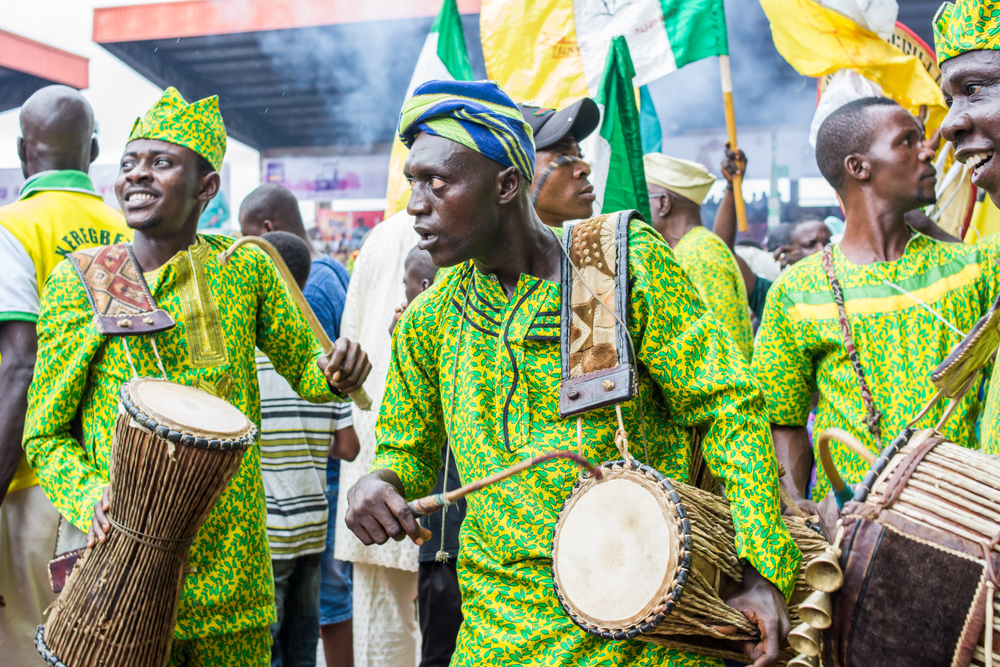
The Yoruba religion includes the various faith traditions and spiritual beliefs of the Yoruba people of Nigeria. Many of this religion’s imagery and concepts have shown up in Western media, most notably in the recent film “Black Is King” released by recording artist Beyoncé. Increasingly, members of the African diaspora in the Americas have been drawn to the concepts and ideas presented in the Yoruba religion. This demands a closer look at this particular faith and its descendant creeds that have spread throughout the Americas.
Understanding the Basics
According to the Yoruba religion, everyone experiences destiny or fate, which is known as Ayanmo. Adherents believe all people will eventually reach a state of oneness with the divine creator, from whom all energies originate. This state is referred to as Olodumare, which is also the name of the divine being who is the creator of all things. Olodumare is not associated with a gender and is usually referred to with the pronoun “they.” Per the Yoruba faith, life and death are about existing in various realms, with the spirit eventually progressing toward Olodumare. This divine being doesn’t involve themselves with human affairs. Communication is only done by prayer to orishas, divine intermediaries that have specific control over various elements in nature.
Examining Creation
The creation of the world is an important part of Yoruba beliefs. According to this religion, Earth was originally considered to be too wet to be inhabitable. An orisha named Obatala requested permission from Olodumare, or Olorun, to create dry land for other creatures to live on. Obatala did this by taking a bag and packing a shell filled with sand, a white hen, and a palm nut, among other items. After climbing down from the sky on a long gold chain, he poured out the sand and the hen spread it around, forming mountains and valleys. Obatala then planted the palm nut, which grew and spread into multiple trees. Eventually, Obatala formed creatures out of the dirt into which Olorun breathed life, and thus the genesis of humankind. Both divinities and humans possess Asé, the life force found in all things.
Embracing Reincarnation
Yoruba religion adherents believe in Atunwa, which is a type of reincarnation in which family members return. Upon completion of a life well lived, a person is rewarded with reincarnation. Children and grandchildren are often viewed as reincarnated ancestors. This belief is reflected in some Yoruba names, such as Babatunde, which means “father returns” and Yetunde, which means “mother returns.” As per the faith, reincarnation is not limited to a specific gender. In this spiritual tradition, newborns carry not only the wisdom of their ancestors but also their collective knowledge from past lives.
Tracing Yoruba-Based Religions
Given centuries of migration of Yoruba people to the Americas, particularly through the Atlantic slave trade, a number of syncretic faiths have arisen that find their roots in that of the Yoruba:
- Candomblé: Developed in Brazil during the early 1800s amidst the slave trade, this religion combines elements of Yoruba and Roman Catholicism.
- Santería: Also a syncretic combination of Yoruba faith and Roman Catholicism, this belief system was formed in Cuba between the 1500s and 1800s.
- Spiritual Baptist: A Protestant faith formed by Africans enslaved by the British, it’s largely practiced in several Caribbean islands where adherents consider themselves Christian.
- Trinidad Orisha: Also known as Shango, this creed is largely adhered to in Trinidad & Tobago, with influences from Baptist faiths as well as Catholicism, Hinduism, Islam, Buddhism, and Baha’i.
- Umbanda: A blend of Yoruba religion, Catholicism, Spiritism and indigenous beliefs, Umbanda has devotees who live mostly in Brazil, Argentina, and Portugal.
While African spiritualities are often thought of as vague and insular in Western society, the Yoruba religion has been influential for centuries. From enslaved Africans dealing with trauma to members of the diaspora seeking to connect to the past, the Yoruba faith continues to inspire millions of people far from home.

